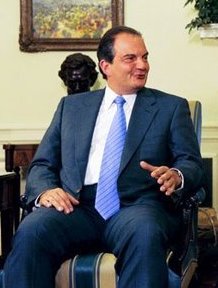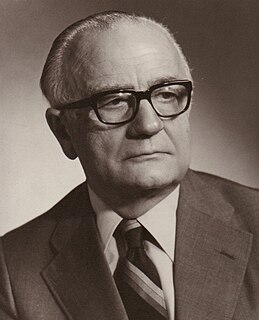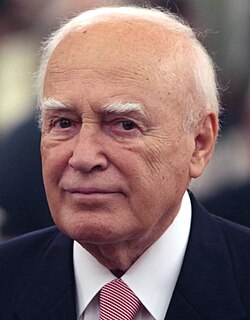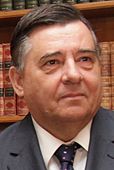
Andreas Georgios Papandreou was a Greek economist, a socialist politician and a dominant figure in Greek politics. The son of Georgios Papandreou, Andreas was a Harvard-trained academic. He served three terms as prime minister of Greece.

George Andreas Papandreou is a Greek American politician who served as Prime Minister of Greece from 2009 to 2011.

Konstantinos G. Simitis, usually referred to as Costas Simitis or Kostas Simitis, is a Greek politician who served as Prime Minister of Greece and was leader of the Panhellenic Socialist Movement (PASOK) from 1996 to 2004.

The Panhellenic Socialist Movement, known mostly by its acronym PASOK is a social-democratic political party in Greece.

Parliamentary elections were held in Greece on 7 March 2004. The New Democracy Party of Kostas Karamanlis won the elections, ending eleven years of rule by the Panhellenic Socialist Movement (PASOK). PASOK was led into the elections by George Papandreou, who succeeded retiring Prime Minister Costas Simitis as party leader in February.
Tzannis Tzannetakis was a Greek politician who was briefly Prime Minister of Greece during the political crisis of 1989.

Antonis Samaras is a Greek politician who was Prime Minister of Greece from 2012 to 2015 and leader of New Democracy from 2009 to 2015. Samaras previously served as Minister of Finance in 1989, as Minister of Foreign Affairs from 1989 to 1992, and as Minister of Culture and Sport in 2009.

Ioannis Alevras was a Greek Panhellenic Socialist Movement politician and Speaker of the Hellenic Parliament, who served as acting President of Greece in March 1985.

Evangelos Venizelos is a Greek politician who was Deputy Prime Minister of Greece and Minister for Foreign Affairs from 25 June 2013 to 27 January 2015. Previously, he was Deputy Prime Minister and Minister for Finance of Greece from 17 June 2011 to 21 March 2012. He is a member of the Hellenic Parliament for the Panhellenic Socialist Movement (PASOK) for the first electoral district of Thessaloniki.

Parliamentary elections were held in Greece on 17 November 1974. They were the first after the end of the Greek military junta of 1967–1974 and took place during the metapolitefsi era. The winner was Konstantinos Karamanlis and his newly formed conservative party, ND. Karamanlis had already formed a government of national unity just after the fall of the dictatorship. The second biggest party was the centrist Center Union - New Forces. Third power in the Parliament became the newly formed PASOK, a radical socialist party led by Andreas Papandreou, son of the former prime minister Georgios Papandreou.

Parliamentary elections were held in Greece on 20 November 1977. After Prime Minister Constantine Karamanlis called for early elections, his New Democracy party suffered a significant loss of power. However, Karamanlis managed to secure an absolute majority in the Parliament. The big surprise was the success of PASOK, whose socialistic rhetoric remained radical. Because of PASOK's success, the Centrists led again by Georgios Mavros lost half of their power. As a result, Andreas Papandreou, PASOK's leader, became a prominent figure in Greek politics. The Communists and the Nationalists managed to amplify their support.

Parliamentary elections were held in Greece on Sunday, 18 October 1981. The Panhellenic Socialist Movement (PASOK), led by Andreas Papandreou, faced New Democracy, led by Georgios Rallis. Papandreou achieved a landslide and PASOK formed the first socialist government in the history of Greece.

Parliamentary elections were held in Greece on Sunday, September 16, 2007, to elect the 300 members of the Hellenic Parliament. The leading party for a second term was New Democracy under the leadership of Kostas Karamanlis with 41.83%, followed by George Papandreou and Panhellenic Socialist Movement (PASOK) with 38.10%. New Democracy managed to secure an absolute but narrow majority of 152 out of 300 parliament seats. The populist Popular Orthodox Rally entered the parliament for the first time with 10 seats, while the parties of the left, the Communist Party of Greece (KKE) and the Coalition of the Radical Left (SYRIZA), enjoyed a significant increase in their votes. KKE got 8.15% of the votes and secured 22 parliament seats and SYRIZA got 5.04% of the votes (+1.78%) and 14 seats.
In early 2006, Prime Minister Kostas Karamanlis announced ruling New Democracy's initiative for a new amendment of the Greek Constitution of 1975/1986/2001, and clarified his propositions speaking to the deputies of his party on 11 May 2006.
A leadership election was held on November 11, 2007 in the Panhellenic Socialist Movement (PASOK), Greece's main centre-left party, after it was defeated in the parliamentary election earlier that year. The incumbent, George Papandreou, had stated right after the general elections that he would ask party members to renew their confidence in him, while Evangelos Venizelos and Kostas Skandalidis also declared themselves candidates.

The 2009 New Democracy leadership election was held on 29 November 2009, following the official announcement of the resignation of Kostas Karamanlis, after more than 12 years as leader of New Democracy, the main centre-right political party and one of the two major parties in Greece.
The Movement of Democratic Socialists is a political party in Greece established on 3 January 2015 by George Papandreou after splitting from the Panhellenic Socialist Movement (PASOK). The party officially uses To Kinima as the party's name abbreviation, although several media outlets and opinion pollsters have referred to it using the acronym KIDISO (ΚΙΔΗΣΟ).




























